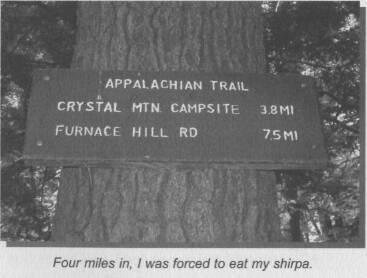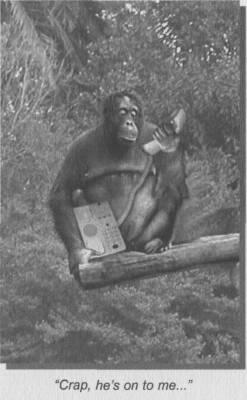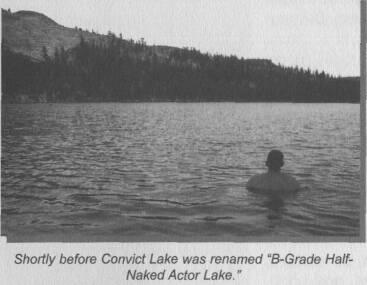If Chins Could Kill: Confessions of a B Movie Actor (61 page)
Read If Chins Could Kill: Confessions of a B Movie Actor Online
Authors: Bruce Campbell
Tags: #Autobiography, #United States, #General, #Biography & Autobiography, #Biography, #Entertainment & Performing Arts - General, #Entertainment & Performing Arts, #Actors, #Performing Arts, #Entertainment & Performing Arts - Actors & Actresses, #1958-, #History & Criticism, #Film & Video, #Bruce, #Motion picture actors and actr, #Film & Video - History & Criticism, #Campbell, #Motion picture actors and actresses - United States, #Film & Video - General, #Motion picture actors and actresses

Behind the fence, patrolling soldiers in navy uniforms scanned the compound with flashlights. By the look of things, it was either the home of some rich jerk with a bad case of paranoia, or an embassy that didn't want any visitors. As I neared the gated entrance, a sign cleared everything up: NAVAL OBSERVATORY -- HOME OF THE ATOMIC CLOCK.
Well, that's a bit of a letdown,
I thought, and turned around.
On the way back, I passed a patrolling soldier, this time
outside
the fence. I smiled and nodded with a "Good evening." He must have been programmed not to respond, because he walked by without looking up or saying a word.
Big deal,
I reasoned.
What's so precious about an atomic clock that it has to be protected twenty-four hours a day?
The next day, appearing on a morning show, I was embarrassed to learn that the Naval Observatory houses more than an atomic clock -- Vice President Dick Cheney stays there, too. Heh-heh.
During the course of the tour, I walked along highways, rural roads, railroad tracks, through Central Park in New York City, across government land, through every strata of neighborhood, and, when all else failed, around airport terminals.
I got the shock of my life in Atlanta one evening. A huge park, positively riddled with walking paths, was directly accessible from my hotel and, seemingly, I had the joint to myself. But as I walked, I couldn't help feeling that I was being watched. I'm a sturdy guy, and I can take care of myself in most scenarios, but I wasn't getting the "I'm gonna rob you" vibe from the shadows, I was getting the "come into the shadows for a good time" vibe.
Then it made sense; as I walked near weeping willow trees that surrounded a beautiful pond, numerous men stood up from park benches, or stepped into the light so I could see them. As I picked up my pace, ever so slightly, the only thing I could see clearly that night was the desperation on their faces.
The Appalachian National Scenic Trail has an entirely different vibe. It says: "I bet you can't hike me for 2,167 miles from Maine to Georgia." This old trail, the first of its kind in 1937, has always fascinated me. The idea that a single footpath runs the entire distance is positively medieval. I've walked a few miles on sections of it in Georgia, while visiting relatives, once while working on a film in Rutland, Vermont, and the latest time, in Dalton, Massachusetts -- smack dab in the middle of the book tour.
To those who seek outdoor activities, the Appalachian Trail is a legend. To the locals around Dalton, it doesn't exist. Honestly, they had no idea what I was talking about. Finally, at a Laundromat (which made sense, considering the amount of backpackers doing laundry there), they pointed me to an area where I could access a trailhead.
That October 13, fall was in full swing in New England; colors were at their absolute peak, the sky was clear, and a crisp breeze juggled a thousand falling leaves at a time. As I drove several miles to the trailhead, Skippy the Squirrel absolutely pelted my car with acorns the size of walnuts.
At the trail entrance, I was faced with the option of hiking north or south. I chose north, but it didn't really make any difference -- either way, I was on "the trail." An interesting thing about the "AT" (the insider term) is that, although winding through woods most of the time, it's never far from numerous small, medium, and large towns. This allowed me to "take a walk with Ida" for about a mile, via cell phone. Ida and I have gotten used to this routine when we can't travel together. It's a way of sharing experiences and recapping the day, much like you would if you were actually walking together. It's freakish, I know, but it's just another attempt to stay connected amid the chaos.
I hiked for several hours, then came across a forest glade on the crest of a hill. It seemed ideal for just about anything, but at that moment, a nap was the first order of business. I wadded my fleece vest into a pillow, and passed out for an hour.
Walking back to the car, worn out but utterly satisfied, I wondered if I had the stuff to walk all two thousand some-odd grueling miles of the Appalachian Trail -- camping out every night for months in every imaginable weather condition, eating freeze-dried food, and washing my clothes once every three or four days. The trail and I have not yet come to terms, but the concept will remain in my mind until more fully addressed in the future.
It seems like everyone has a cell phone these days. At a gathering of any reasonable size, you can pretty much guarantee that some yahoo's phone will ring. Because book signings lasted well into the evening on occasion, I found that prank phone calls provided an excellent break for both the crowd and my signing hand.
As a kid, prank phone calls were a staple of my life. Long before caller ID, I learned to ad-lib my way in or out of most anything. In retrospect, it was fine acting training. When a phone rang during my readings, question and answer sessions, or signings, I'd try and grab it before anyone could answer.
"Hello... mom?" I said, glancing at "Mom" on the cell phone screen.
"Who is this?" the concerned woman asked, after an initial pause.
"I'm... (silently asking the cell phone owner for his name)... Tim."
"No, you're not," she said, getting more forceful, yet frightened at the same time. "My God, what have you done with my little Timmy?!"
When I wasn't reigning terror in the hearts of families, I woke up wives, interrupted important meetings, left voicemail greetings and bitched about a rented gorilla suit -- all with the blessing of knowing participants.
"Smith and Sons costumes..."
"Uh, yes, George Abernethy here. I rented a gorilla suit from you and I have to tell you, it just stinks to high heaven. Do you fumigate these things?"
"Yes we do, sir."
"With what? Locker room towels?"
"Sir, I'm very sorry you're having this problem," he said, without a bit of remorse. "But I can't help you."
"Why not?" I asked.
"Because we don't even have a gorilla costume in stock. We only carry an orangutan, and it's here in the store."
"Yeah, but you see, I --"
"Aren't you a little old to be making prank phone calls?" he scolded, and hung up.
I'm not sure about your summer of 2001, but mine was hot. I drove through significant parts of the West and Pacific Northwest during July and August. On a hot road trip you can almost always find a motel with a pool, but more often than not, they're "closed for repair," or should be, and even if kids haven't been whizzing them all day, most modern-day pools are too small to really swim in.
Ida and I accepted the challenge to find more interesting ways to stay cool along the way. To accommodate a chance discovery or quick impulse, we traveled in our bathing suits between bookstores across much of the West.
Aside from storing massive amounts of nuclear waste, Nevada generally has clean air, strong wind, and, aside from Las Vegas, plenty of isolation. It doesn't have much in the way of water, but like much of the West, Nevada has a network of dams and reservoirs that are relatively available to the public.
Topaz Lake, a multi-use reservoir, provided one of the most beautiful late afternoon summer experiences I've had since childhood. Water in the reservoir was bathwater warm, surprisingly clear, and there weren't but a handful of other people in this gigantic, man-made lake in the middle of nowhere.
Reservoirs come in all sizes and degree of development. In rural California, I waded through a soggy shoreline marsh to access a nameless reservoir. High in the Sierras, Convict Lake is formed by nothing more than an old mining dam, and its snow-fed waters will eject your frigid body in seconds.
Larger reservoirs, many of them the end result of Depression Era work projects, are usually outside large metropolitan areas and aren't as scenic. Driving home to Oregon after a batch of signings in Los Angeles, Ida and I stopped off at Castaic "Lake," a large reservoir just north of the city.
In contrast to Topaz, access to this one was easy, and it was close to a giant city. As a result, it was completely overrun by humans to a massive degree -- most of them loitering, littering, or cranking up boom boxes -- anything but swimming. Aside from reservoirs, Ida and I enjoyed dunking in the odd river, like the Sacramento, and in streams, tributaries, ponds, and even a quick dip in the Pacific Ocean.
Gambling seems to be more and more prevalent in our society. In obscure regions of the West, new casinos have sprung up like Buck Brush in May. This is due, in part, because Native Americans have recently begun to use their sovereign right to set up houses of gaming. The long-term success or failure for the Native Americans remains to be seen, but for the short term they are making money -- some of it from me. Every so often, if a casino was "on the way," I'd cough up my limit of a hundred bucks and let the one-armed bandits have their way with me.
Staying at the MGM Grand in Las Vegas was a trip. The entrance alone looked more like curbside check-in at American Airlines than a hotel. Inside, the scale of the casino was hard to take in. These monstrosities are now a combination of mall and resort, where kids can play while their parents sneak off to gamble their vacation money away.
I was glad to see that the old adage about gambling is still true: giant casinos aren't built because they
lose
money. I proved that again at a casino in Windsor, Ontario, where I lost another hundred dollars. This time, I reasoned that it was a loss of only sixty-six dollars, once you factored in the exchange rate. I considered myself lucky and haven't been into a casino since.
Because
If Chins Could Kill
celebrates the independent filmmaker, I knew the book tour wouldn't be complete without a swing through the small town that hosted the original
Evil Dead --
Morristown, Tennessee. By sheer coincidence, I was scheduled to be in Knoxville, Tennessee, a mere forty miles away, on November 2.
A trip to the cabin site was a great idea, but I hadn't been back there in years, or stayed in touch with our local contact, Gary Holt. Fate smiled on me during an interview with a Knoxville journalist who was pretty keen to watch this happen when I mentioned it. He was from the Morristown area originally, and had a good idea where to look for Gary.



